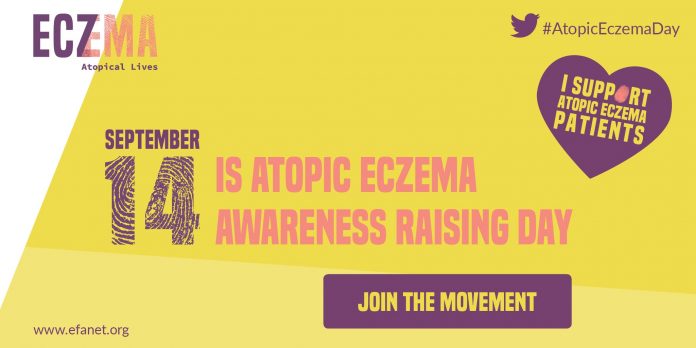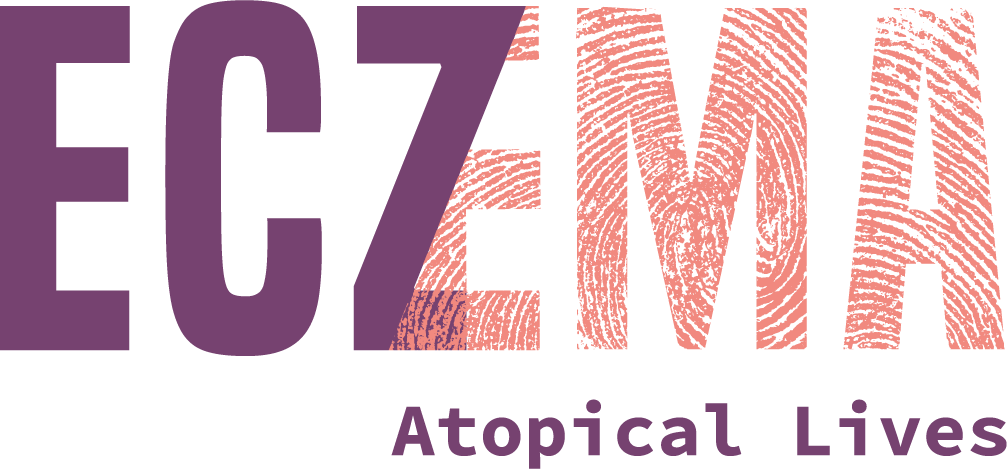Bernd Arents, Patient Advocate from the European Federation of Allergies and Airways Diseases Patients’ Associations (EFA) Dutch Member VMCE, discusses the importance of raising awareness when it comes to people living with atopic eczema (atopic dermatitis)
Why is being aware of people living with eczema so important? I, Bernd Arents (54) have severe atopic eczema and am a patient advocate from the Netherlands.
This year, for the first time, an awareness day for people living with atopic eczema is held on September 14th. It’s truly a new chapter for those who have this patchy, itching and difficult-to-live-with chronic skin disease (which is not contagious, just to be clear).
Over one in ten children in industrialised countries get atopic eczema. By the age of 12, three-quarters of them have outgrown it. Yet, some people have eczema in a more severe form, sometimes all over the body which is more difficult to treat. For those – and in the case of children, also their parents and siblings – living with atopic eczema is truly a challenge.
A recent survey on almost 1,200 adults living with severe atopic eczema in nine EU-countries, to which I contributed as a patient advisor, shows that participants found it important that other people are aware of how it is to live with eczema. (1) Having eczema, myself from top-till-toe since I was five, I completely understand. September 14th, 2018 is, therefore, a sympathetic day a year to realise what it is like to live with itchy and disfigured skin.
Atopic eczema patients are masters of disguise
‘We’, the people with eczema including myself, also need to be honest: we are masters of disguise. Rarely do I encounter in public others who experience eczema the way I have. Why is this the case? They do the same thing as I do: we cover it up. I did that when I was in my teens, wearing long-sleeved shirts and full-length trousers to school and I still do that today. So, how could the general public notice you live with eczema? They can’t.
The point of hiding eczema is that no-one wants to be different; we all want to fit in. People with eczema want to stand out for their positive features, not to be noticed for just the flaws of their skin. And there are downsides to showing your eczema in public. Either people ask, ‘what is the matter with your skin?’ as if you need to explain yourself; or you receive unsolicited advice: ‘Is that eczema? Well, have you tried this and that, because…’ and so on. I do not know which one is most bothersome, but you surely want to avoid both.
Patients hide the deep extent atopic eczema has
There are some people who are surely aware of our eczema because they know us well: our loved ones, friends, roommates and colleagues. Since eczema usually starts in early childhood, family and childhood friends were already aware of it. During adulthood, at some point, we had to ‘disclose’ it to others because you cannot keep hiding it.
Those people who are close to us surely look beyond our eczema, as for them it is just another part of who we are. But, we also have to be honest that we do not show them how it is to live with eczema, truly. Or at least not all the time. We don’t want to be a burden, now do we? This implies that even those who are closest to us eventually become ‘aware, yet unaware’. That makes life easier, yet it also can make us feel alone.
Even doctors might be ‘aware, yet unaware’, as they see people with eczema all the time. Depending on the setting, the severity of eczema can be judged differently: what is considered very severe for a general practitioner might be moderate for a dermatologist who has seen worse. But the key question is: are they aware of how it impacts the lives of their patients? In my experience: not always. And are the treatments working well enough? Not always.
The extent of the emotional impact of having eczema is crystal clear from our survey. Here are just a couple of the 28 statements and what those 1,200 people with more severe eczema felt at the time of taking the survey:
- 72% envied people with normal skin;
- 50% felt sad about having eczema;
- 43% were angry about having eczema;
- 40% felt embarrassed about their skin;
- 39% felt guilty about scratching;
- 39% struggled with their appearance and;
- 34% tried to avoid physical contact.
One of the most distressing findings of the study is that 88% of the people who at the time of the survey experienced severe eczema symptoms, stated that their eczema at least partly compromised their ability to face life.
The European Atopic Eczema Awareness Day: September 14th
This quality of life study shows that adults with a more severe form of eczema are suffering from the condition and this is more than anybody can bear. Fortunately, the people close to us know that, at least when we let them know. But the general public, health care professionals, policymakers and health insurers should be made more aware of this suffering. There should be more efforts to develop effective treatments and access to better and affordable health care should be available to us all, to relieve the physical, psychological and emotional burden of eczema.
That’s why the European Eczema Awareness Day is not just a sympathetic gesture, as I suggested at the beginning of this article, but of great importance, even if it is for just one day.
1 European Federation of Allergies and Airways Diseases (EFA), Itching for Life: Quality of Life and Costs for People with Severe Atopic Eczema in Europe, 14th September 2018: www.efanet.org

Bernd Arents
Patient Advocate from the Netherlands
European Federation of Allergies and Airways Diseases Patients’
Associations (EFA)
Tel: +32 (0)2 227 2712













Amazing article! Dermatitis is very hard to treat!